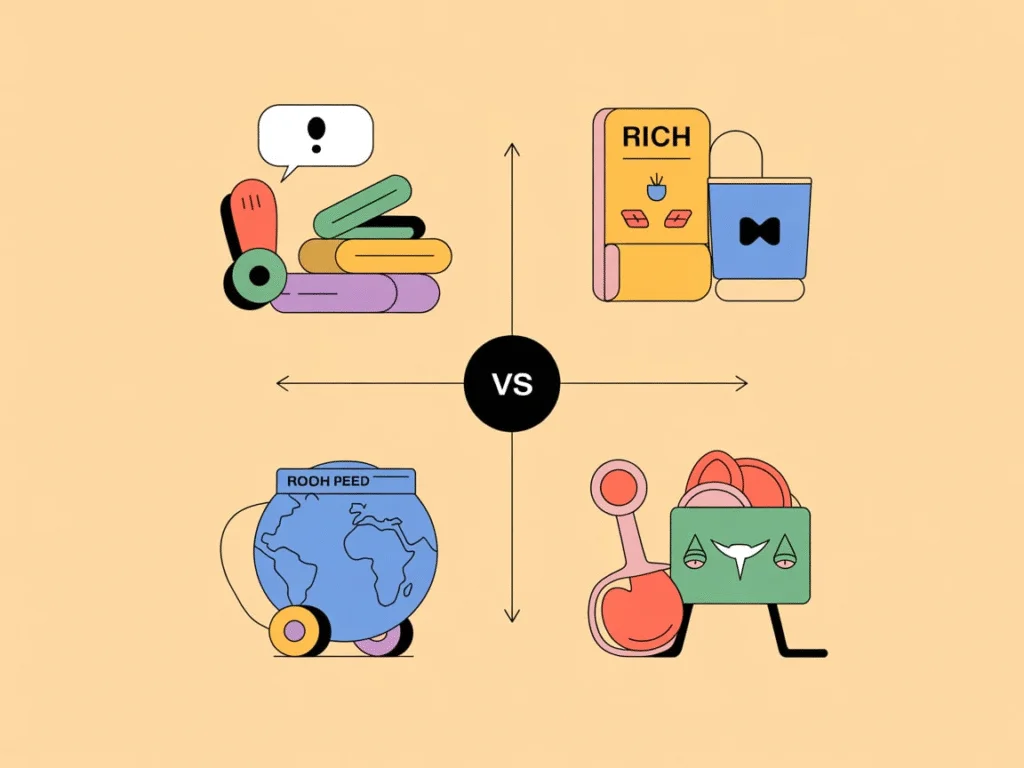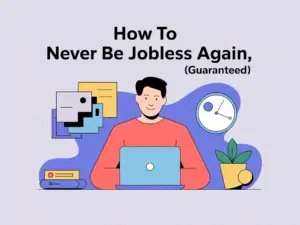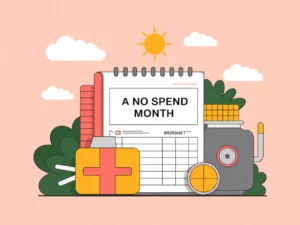Hobbies. We all have them, but not all hobbies are created equal. What you do in your free time can actually say a lot about your mindset, priorities, and even your financial future.
Think about it: some people spend hours learning new skills, reading books, or building connections through their hobbies. Others spend the same time binge-watching TV, scrolling social media, or gambling. The choices may seem small, but over time, they make a huge difference.
Your hobbies can shape your habits, your thinking, and even your bank account. Yes, seriously. The way you spend your leisure time reflects your mindset and often separates people who are financially successful from those who struggle.
In this article, we’ll explore the key differences between the hobbies of rich people and poor people, why those differences matter, and how you can shift your own habits for growth.

Understanding Hobbies: Mindset vs. Entertainment
Hobbies aren’t just about fun. They’re about how you spend your energy, time, and attention. They reflect your priorities.
Hobbies Shape Thinking
When you spend your free time learning, creating, or problem-solving, you’re training your brain. You’re building skills that transfer to other areas of life. Hobbies like reading, coding, writing, or playing strategy games enhance focus, discipline, and creativity.
On the other hand, hobbies that revolve around passive consumption—like endlessly scrolling social media or watching TV—rarely improve your skills. They’re entertaining, sure, but they don’t grow your mind or your opportunities.
Productive vs. Passive Hobbies
Some hobbies are inherently productive. They teach you something new, connect you with people, or challenge you. Productive hobbies may even lead to income streams or business ideas over time.
Passive hobbies, while relaxing, often provide only temporary satisfaction. There’s nothing wrong with chilling out, but if the majority of your leisure time is spent passively consuming, you might be limiting your growth without even realizing it.
How Interests Influence Growth
Rich people often treat hobbies as extensions of personal and professional growth. Poor people—or those struggling financially—tend to focus more on immediate pleasure. Over time, the accumulation of these small decisions creates a major gap in skills, mindset, and opportunities.
The Psychology of Leisure and Wealth
Leisure isn’t just about fun—it’s about what you value. People who value growth choose hobbies that feed their knowledge, network, and personal development. People who value instant gratification may prioritize entertainment or escapism.
Rich People’s Hobbies
Rich people often approach hobbies differently. Their free time isn’t just for fun—it’s an investment in themselves, their skills, and their network. Here’s what sets their hobbies apart.
Reading: Books That Teach and Inspire
Many successful people read regularly. Not just novels, but books about business, psychology, history, and personal growth. Reading expands their knowledge, exposes them to new ideas, and sparks creativity. Even just 30 minutes a day can compound into huge mental growth over time.
Networking Through Social Clubs or Sports
Hobbies that involve other people often double as networking opportunities. Golf clubs, tennis leagues, or social clubs aren’t just fun—they connect you with people who share your interests and can open doors professionally. Rich people know that relationships are one of their greatest assets.
Learning New Skills
Languages, instruments, coding, public speaking—hobbies that teach new skills keep the mind sharp. These hobbies don’t just provide fun; they can enhance career opportunities and even create new income streams.
Fitness as a Lifestyle Investment
Exercise isn’t just about looking good. It’s about energy, discipline, and longevity. Rich people often treat fitness as a long-term investment in their health, mental clarity, and productivity. Running, yoga, cycling, or gym workouts are common examples.
Traveling to Gain Perspective
Travel isn’t just a luxury—it’s education. Experiencing new cultures, meeting different people, and stepping out of comfort zones broadens perspective. Travel can inspire new ideas, spark creativity, and even uncover business opportunities.
Investing and Financial Education as a Hobby
Many wealthy people treat investing as a hobby. They read about markets, follow trends, and experiment with small investments. This habit continuously grows their wealth while teaching them valuable lessons in risk and decision-making.
Philanthropy and Giving Back
Helping others can be both fulfilling and strategic. Rich people often volunteer or donate, which strengthens their network, builds reputation, and creates a sense of purpose. It’s a hobby with both emotional and social ROI.
Creative Hobbies That Build Discipline
Painting, writing, music, or other arts aren’t just for fun—they teach patience, focus, and problem-solving. Engaging in creative hobbies keeps the mind flexible and encourages innovative thinking.
Mentorship and Coaching Others
Teaching or mentoring can be a hobby too. Sharing knowledge reinforces your own skills and expands your influence. Many successful people enjoy this because it’s rewarding and strategically beneficial.
Strategic Games
Chess, poker, or strategy games sharpen decision-making, patience, and analytical thinking. These aren’t just games—they’re exercises in planning, risk assessment, and focus.
Attending Workshops, Seminars, and Conferences
Workshops and conferences combine learning with networking. They expose people to new ideas, trends, and opportunities. For many wealthy individuals, attending these events is both a hobby and a growth strategy.
Poor People’s Hobbies
While rich people often treat hobbies as investments in growth, poor or struggling individuals tend to spend free time on passive, short-term pleasure activities. These hobbies aren’t inherently “bad”—everyone needs to relax—but when they dominate your life, they can limit skills, opportunities, and even financial progress.
Excessive TV and Streaming Shows
Binge-watching TV or streaming shows for hours every day can become a time trap. It provides instant gratification but rarely contributes to learning, networking, or skill-building. A little entertainment is fine—but too much turns leisure into stagnation.
Gaming Without Skill Development
Video games can be fun, but if played excessively without purpose, they can consume hours without giving real-life value. There’s nothing wrong with enjoying games, but balance is key. Hobbies should ideally build your mind, not just distract it.
Mindless Social Media Scrolling
Scrolling endlessly through social media feeds can feel relaxing—but it’s passive, addictive, and often leaves you feeling drained. Time spent on social media could be redirected to learning, networking, or creating something meaningful.
Gambling and Lotteries
Gambling or buying lottery tickets may seem exciting, but statistically, they rarely pay off. While a small, controlled hobby is okay for fun, relying on chance as a financial strategy is a recipe for disappointment.
Consuming Entertainment Without Learning
Movies, podcasts, or videos that are purely for entertainment are fine in moderation. But when your leisure time is mostly spent consuming without reflecting, analyzing, or applying knowledge, it limits your growth potential.
Chasing Trends Instead of Long-Term Interests
Jumping from one hobby or trend to another—whether it’s fads, viral challenges, or gimmicks—offers short bursts of excitement but little lasting benefit. Sustainable hobbies develop skills, habits, and networks over time.
Spending Money Without ROI
Some hobbies involve constant spending on things that don’t bring skill, joy, or financial return—like endless shopping, gadgets, or collectibles. If your hobby drains resources without growth or value, it may be worth reconsidering.
Passive Hobbies That Don’t Grow You
The common theme: passive hobbies—watching, scrolling, or gaming—don’t build skills, networks, or wealth. They provide temporary pleasure but don’t prepare you for future opportunities.
Avoiding Challenges or Skill Development
Poor people’s hobbies often prioritize comfort over challenge. Growth-oriented hobbies usually involve learning, risk-taking, or effort. Without this, it’s hard to develop skills that translate to career or financial advancement.
Instant Gratification Activities
The biggest difference is mindset. Hobbies that satisfy immediate desires rather than long-term benefits can reinforce a short-term thinking pattern, keeping you stuck in a cycle of consumption rather than growth.
Key Differences Between Rich and Poor People’s Hobbies
The hobbies people choose aren’t just leisure activities—they reveal mindset and priorities. Here’s what separates rich people from poor people in how they spend their free time:
Growth-Oriented vs. Consumption-Oriented
Rich people pick hobbies that expand their knowledge, skills, and networks. Poor people often choose hobbies that consume time and attention without long-term benefits.
Skill-Building vs. Time-Wasting
Wealthy individuals treat hobbies as opportunities to develop abilities—like learning a language, playing an instrument, or coding. Passive hobbies like endless TV or social media scrolling rarely teach new skills.
Networking and Social Capital vs. Isolation
Many rich hobbies involve connecting with like-minded individuals. Social clubs, workshops, or mastermind groups build relationships. Passive hobbies, by contrast, often keep people isolated.
Long-Term Thinking vs. Short-Term Pleasure
Rich people plan hobbies with future rewards in mind, whether it’s learning a skill, investing, or traveling to gain perspective. Poor people often focus on instant gratification, which feels good now but rarely benefits the future.
Mindset of Learning vs. Mindset of Entertainment
A growth mindset fuels success. Rich hobbies challenge the mind and encourage learning. Passive hobbies prioritize entertainment without growth.
Hobbies That Add Value vs. Hobbies That Drain Energy
Rich hobbies energize, inspire, and open doors. Passive hobbies can drain mental energy, leaving people feeling unproductive or stuck.
How to Shift Your Hobbies for Wealth and Growth
The good news? You can change your hobby habits—and in turn, your mindset and opportunities.
Identify Which Hobbies Actually Benefit You
Make a list of your current hobbies. Ask: Does this grow me, teach me, or connect me with others? Or is it just passing time?
Allocate Time Wisely
Time is your most valuable resource. Prioritize hobbies that expand your knowledge, skills, or network. Even a few hours a week can have a huge long-term impact.
Turn Fun Into Skill Development
Hobbies don’t have to be boring to be productive. Love gaming? Try strategy games that teach problem-solving. Love cooking? Experiment with new cuisines and nutrition research.
Replace Passive Hobbies With Active, Productive Ones
Gradually swap mindless scrolling or binge-watching with reading, learning, creative projects, or networking activities. Small shifts add up.
Make Social Connections Through Hobbies
Join clubs, classes, or online communities that align with your interests. Networking isn’t just for work—it’s a natural byproduct of engaging hobbies.
Use Hobbies to Build Discipline and Consistency
Rich hobbies often require dedication and practice. Commit to a hobby over months or years. Discipline learned in hobbies often transfers to work and financial habits.
Small Changes Lead to Big Mindset Shifts
Even one productive hobby can change how you think, how you spend your time, and how you approach opportunities. Growth compounds—just like money.
Conclusion
Your hobbies reveal your priorities, mindset, and potential. They’re more than just fun—they’re reflections of how you approach life.
Rich people choose hobbies that grow their mind, skills, and network. Poor people often gravitate toward instant gratification and passive consumption. The good news is that anyone can change.
Start small. Pick one hobby this week that challenges you, teaches you something, or connects you with others. Over time, your choices compound, shaping your mindset, opportunities, and even your financial future.
Your free time is your most valuable asset. Spend it wisely, and your life—and bank account—will thank you.


